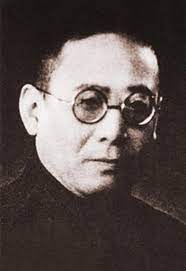Shen Yin-mo (1887-), professor of history and literary man who later won fame as a calligrapher. Wuhsing, Chekiang, was the native place of Shen Yin-mo. After receiving a traditional primary education in the Chinese classics, he attended the Chiahsing Normal School and later joined his brothers, Shen Shih-yuan and Shen Chien-shih, in Japan for advanced studies. Their funds soon ran short, however; and Shen Shih-yuan returned home to teach school so that he could support his younger brothers. Shen Yin-mo was graduated from Kyoto Imperial University in 1912.
From 1914 to 1928 Shen Yin-mo served as a professor of history at Peking University. Under the chancellorship of Ts'ai Yuan-p'ei (q.v.), the university had become a center of a movement against traditionalism in Chinese literature and philosophy, and Shen was an ardent supporter of this movement. He became a frequent contributor to the Hsin ch'ing-nien [new youth], and in 1919 he joined Ch'en Tu-hsiu, Ch'ien Hsuan-t'ung, Hu Shih, Li Ta-chao and Liu Fu (qq.v.) on its board of editors.
Shen Yin-mo left Peking University in 1928 to become commissioner of education for Hopei province. He soon discovered, however, that administrative work did not suit his independent temperament. He resigned in 1930 and assumed the presidency of the newly established Peiping University. After holding that post for two years, he moved to Shanghai and attempted to associate himself with Lu Hsün (Chou Shu-jen, q.v.) in the League of Left-Wing Writers. Because of his past connections with the National Government, however, he was not allowed to play a significant role in the activities of this radical organization. From earliest youth, Shen Yin-mo had practiced the art of calligraphy. He had displayed remarkable talent even as a young man, and he had already become known as a calligrapher at the time of his return from Japan. Shen cultivated this talent assiduously in the following decades. After grounding himself carefully in the seal (chüan) and clerical (li) styles, he became equally proficient in the standard (k'ai), running (hsing), and "grass" (ts'ao) styles through rigid personal discipline involving the writing of at least 500 characters every morning before breakfast. His mastery of many styles earned Shen a unique place in the annals of modern calligraphy. In the early 1930's Shen decided to make calligraphy his profession. His writings were prized for their elegance as well as for their versatility. Some critics, however, discerned in his work a certain lack of originality, a deficiency which, they held, debarred Shen from a place in the roster of all-time calligraphic greats. During this period, Shen also took up the composition of classical poetry, but only as an avocation. During the Sino-Japanese war, Shen Yin-mo was a member of the Control Yuan. The office was little more than a sinecure, but it suited him, for it left his time free for calligraphy. At war's end he established residence in Shanghai. In 1948 he divorced his wife of many years and married a girl who was 20 years his junior. After the Chinese Communists took control of the mainland in 1949, he was offered the post of deputy mayor of Shanghai. He declined the office, but consented to serve instead as an adviser. Thereafter, he led a quiet life, practicing the art of calligraphy and exhibiting his works.
Shen Yin-mo wrote voluminously on the theory and practice of calligraphy. In 1962 he produced Mao chu-hsi shih-tzu erh-shih-i shou [21 poems by Chairman Mao], executed in the small k'ai style, to serve as a calligraphic model for the new simplified orthography. In 1963 Shen started the series Li-tai ming-chia hsueh-shu ching-yen chi-yao shih-i [a compendium of the experience of famous calligraphers throughout the ages in their study of the art, with explanations].

沈尹默
沈尹默(1887—),历史学教授,文人,后以书法家著名。
沈尹默原籍浙江吴兴,幼受中国古籍教育,后进嘉兴师范学校,又和兄沈士远、沈兼士一起去日本留学。因经济困难,沈士远回国教书维持两个弟弟留学费用,1912年沈尹默毕业于京都帝国大学。
1914年到1928年间,沈尹默在北京大学任历史教授。在蔡元培任校长时,北京大学是当时反对中国文学和哲学中的传统思想运动的中心,沈尹默是这个运动的热诚支持者。他经常为《新青年》撰稿。1919年,他和陈独秀、钱玄同、胡适、李大钊、刘复同任该杂志编辑。
1928年,沈尹默离开北京大学,任河北省教育厅长。他不久发现行政工作对他的独立不羁的习性不适合,遂于1930年辞职,去新建的北平大学任校长。两年后去上海,企图和鲁迅在左翼作家联盟内合作。因为他过去与国民政府有联系,所以未能在这个激进组织的活动中起到重要作用。
沈尹默早年就习练书法,当他还是一个青年时,就表现出了这方面的出色才能。从日本回国后,他的书法已很有名。在以后几十年中,他认真地培植自己的这方面才能,他以篆、隶为基础,发展到对楷、行、草书都很精通,他每日清晨早饭前必习写五百个字,他擅长各种书法,使他在现代书法界中独占一位。三十年代初,他决心以书法为业。他的书法秀丽多姿,但有的批评家认为他缺少独创性因此不能进入历代名家之列。此外,他又吟诗以作消遣。
中日战争时,沈尹默任监察院委员,这不过是一个闲职,但这个职务很适合他,因为他有时间从事书法。战争结束后,他定居上海。1948生他和生活多年的妻子离异,并同一个小于他二十岁的妇女结婚。1949年共产党接管大陆后,提名他为上海市副市长,他不愿接受,但同意当一名顾问。此后他过着宁静的生活,习练书法和展出自己的作品。
沈尹默写了大量有关书法理论和实践的文章。1962年他用小楷撰写《毛主席诗词二十—首》,作为简体字书法的示范。1963年他编写《历代名家学书经验辑要释义》。